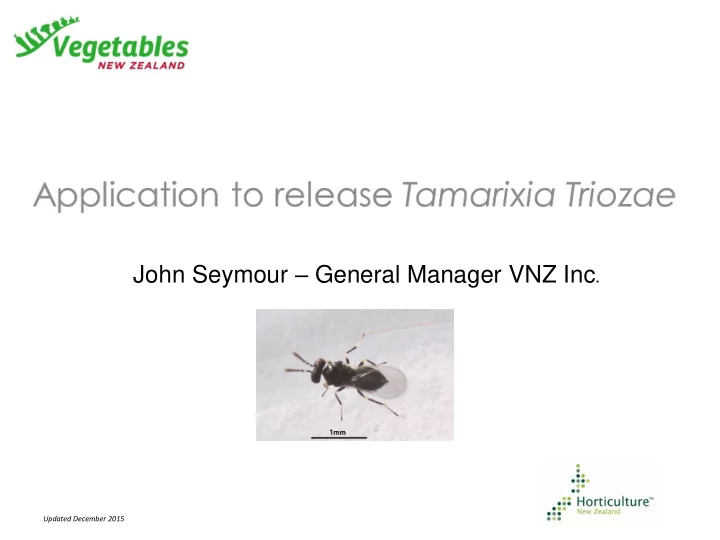

John Seymour – General Manager VNZ Inc . Updated December 2015
Vegetables NZ Inc. - Key points As one of several horticultural organisations supporting the EPA / Tamarixia application - Vegetables NZ Inc, is also seeking the introduction of the Biological Control Agent (or BCA) Tamarixia to assist with the biological control of TPP (Tomato, Potato Physillid) in capsicum crops.
You will be aware that one important aspect of the sustainable management of TPP is the development of IPM programmes that enable growers to optimise the effectiveness of natural enemies in their crops. The integration of beneficial insects such as Tamarixia in an IPM strategy would reduce the reliance on broad spectrum insecticides and increase the levels of control or eradication .
As stated in the EPA application the commercial value of the Capsicum sector is over $63m with $28m specifically grown for our export markets with a further $35m for NZ consumers . However the phased reduction of agrichemical use in Greenhouse capsicum IPM programmes and the inability to use a range of BCA’s is having a negative impact on the competitive position our export growers have had in the past.
In New Zealand lower yield volumes and poorer fruit quality from restrictive IPM programmes have caused a significant increase in costs per unit while the global trend is for consumers wanting more fresh food from biologically controlled environments .
These factors are starting to have a long term impact on export sales as New Zealand falls further behind in the use of expanded IPM and BCA management practises compared to other countries who have significantly increased their BCA use . This shift in focus for IPM / BCA management is enabling those other countries to become more competitive in our export markets:-
Holland has had a significant 90% reduction in agrichemical use during the past nine years with the introduction of over 12 BCA’s including Tamarixia into their IPM programmes. And while Holland borders a number of other countries, their neighbours view Holland’s BCA programmes as beneficial - rather than a risk to their own production areas . Korea and Mexico have also adopted these extended IPM / BCA programmes also achieving more than a 90% reduction in agri-chemical use
These competing countries are now being seen as “clean & green” fresh produce suppliers - due to the minimal or non- use of agrichemicals - and their fresh produce is becoming more sought after globally as it is more environmentally safe. But the phased reduction in the use of agrichemicals in New Zealand can only work successfully - if there is a sustainable supply of alternative BCA’s .
Japan is New Zealand’s largest capsicum export market accounting for over 70% of our production but we are competing with Holland, Korea and Mexico who are now leading in bio-control programmes and New Zealand will lose the ability to compete in export markets if we do not address the issue and support alternative IPM solutions such as Tamarixia.
Recommend
More recommend